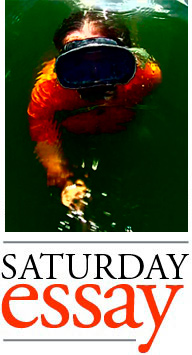Bits of Bly: The Suburbs of Jerusalem
In part two of the 1997 Robert Bly interview from KUMD, the poet talks about nature as an influence and following a thread with words.
In part two of the 1997 Robert Bly interview from KUMD, the poet talks about nature as an influence and following a thread with words.
Poet and social critic Robert Bly, who penned many of his works from a cabin on Moosehead Lake about 30 miles southwest of Duluth, died on Nov. 21 at the age of 94. He was interviewed in the fall of 1997 on KUMD radio in Duluth, and a cassette of the interview survives in the Perfect Duluth Day archive. Consider the clip above to be part one of a short series.
The interview took place the year after Bly’s book The Sibling Society: An Impassioned Call for the Rediscovery of Adulthood was published.
I’m looking for people attached to Poetry Harbor.
Google tells me that the late Patrick McKinnon (DNT spotlight here) was a founder, maybe? So was Ellie Schoenfeld?
Still working on building a literary history of Duluth. Has anyone information about “The Wordshed” as a Duluth publisher? I can only find:
Alaska: a man from Kanatak: the story of Paul Boskoffsky, by Paul Boskoffsky; Lloyd D Mattson; Harvey Sandstrom. The Wordshed, 2006. ©2002
Alaska: new life for an ancient people, by Lloyd D Mattson; Ruben Hillborn. The Wordshed, 1999. ©1999
Los Angeles Review of Books has a brief mention of Duluth in the opening sentence of a review of three books focused on trees. The reviewer, Barbara Kiser, is a former Duluthian who has lived in London since the 1980s.
 When my father died, I had a surrogate dad waiting in the wings: the work of Ray Bradbury. I was obsessed. I felt I would devote my life to him, a feeling common to loves which last no more than a couple years, as this one did. But they were timeless years. Between my 13th and 15th birthday, with my adult future on the horizon, I was still young enough for summers to last forever.
When my father died, I had a surrogate dad waiting in the wings: the work of Ray Bradbury. I was obsessed. I felt I would devote my life to him, a feeling common to loves which last no more than a couple years, as this one did. But they were timeless years. Between my 13th and 15th birthday, with my adult future on the horizon, I was still young enough for summers to last forever.
Now in my 50s, I retain the suite of Bradbury paperbacks I collected back then. I have no use for them, although no library contains merely useful books. I quit re-reading them decades ago. But there are many reasons for books to be collected. I moved on to obsessions with writers less old-fashioned and less overly lyrical, although not before his lyricism infected my own style. Yet even for me, Bradbury is too breathless and too wordy (although not chatty like Harlan Ellison). He wrote terrible poetry. He became a cranky old man. Film and TV adaptations of his work are, by and large, bad. I now consider him (along with his contemporaries Isaac Asimov and Robert Heinlein) to be a branch of Young Adult (i.e., children’s) literature. But I still give his books a treasured pride of place on my shelves, which overflow with his successors. Strangely, most of my adult favorites also begin with the letter “B”: Burroughs, Ballard, Borges, Bowles … but Bradbury got to me first.
I’m still working on my literary history of Duluth. Lake Superior Writers has published or co-published several volumes. If you were involved in some of these collections and have stories to share, message me or comment below.
I’m trying to build a history of literature in Duluth, and I’ve decided that one useful heuristic would be publishers. So, what can you tell me about Calyx Press and Cecilia Lieder?
The Minnesota Historical Society produced this video dramatizing excerpts from two of novelist and social critic Sinclair Lewis’ breakthrough works — Babbitt and Main Street. Lewis, of course, went on to become a Duluthian and even kind of almost coined the phrase “perfect Duluth day.”
The program is created and hosted by Craig Johnson and features actors David Beukema, Anna Leverett, Damian Leverett and Melanie Wehrmacher. It was filmed on location in Minneapolis, St. Paul and Sauk Centre.
The tenth issue of the Nemadji Review, the University of Wisconsin-Superior’s literary journal, was released in May and a new website was launched. The publication was previously available only in print, but the 2021 issue can be viewed and downloaded online as a PDF file.
From the story on UMD’s website:
UMD’s literary magazine Roaring Muse is a student-led magazine that was started in 1997 by UMD’s Literary Guild. Often including poetry, prose, and artwork, and edited by students, Roaring Muse sought to highlight the great work by UMD’s community, and at one point solicited submissions from community members outside the campus. Since its beginnings in ’97, the magazine has been published on and off and is currently back up and running.
Poetry
Winner: Jess Koski, “Did Geronimo Send Postcards from FL?”
Runner-up: Tina Higgins Wussow, “This is How Scars are Formed”
Short Fiction
Winner: Jess Koski, “Onaabani-giizis—Hard Crust on the Snow Moon”
Runner-up: Vickie Youngquist-Smith, “Autumn Shadow of Death”
Short-short Fiction
Winner: Vickie Youngquist-Smith, “Domestic Duplicity”
Runner-up: Lynn Watson, “But Officer”
Creative nonfiction
Winner: Eric Chandler, “I Have No Idea”
Runner-up: Chris Marcotte, “Holding Hands with an Angel”
Congratulations to everyone who participated in this year’s contest. Lake Superior Writers had 117 entries this year. The organization plans to launch next year’s contest theme in January, with a submission deadline in April.